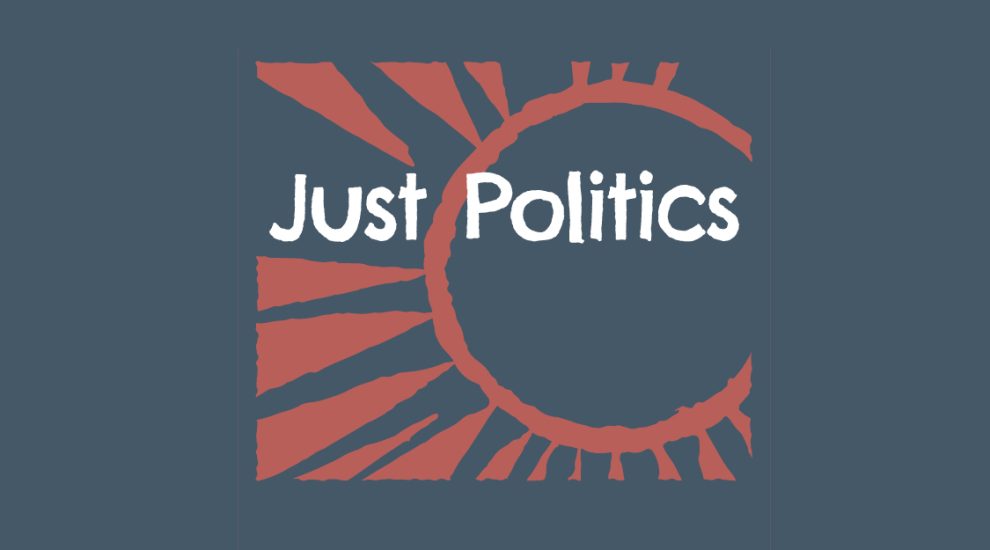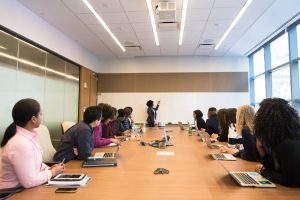What if every family in the United States had enough resources to afford secure housing, eat nourishing food, pay medical bills and childcare expenses, and spend quality time with their loved ones without the constant worry of financial stress?
This is exactly what U.S. Rep. Bonnie Watson Coleman of New Jersey wants to make a reality with the Guaranteed Income Pilot Program Act. The concept of guaranteed income is a simple one: giving families income that they can use to meet their needs. Watson Coleman points to other universal basic income pilot programs that have worked across the country—and even how the federal government offered no-strings-attached supplemental income during the COVID-19 pandemic that lifted millions of individuals, families, and children out of poverty.
As Watson Coleman puts it in this week’s episode of Just Politics, “I don’t think that’s too much to ask for in the richest country in the world.”
Being able to take care of ourselves and our loved ones is foundational to what it means to live in a democracy where everyone can participate and live dignified lives. Join us this week to hear more from Watson Coleman about realizing our freedom to care for ourselves and our families and the importance of electing officials who will ensure that we share our abundant resources justly—so that everyone has what they need to thrive, no exceptions.
As you listen, please be aware that NETWORK Advocates is a 501(c)(3) nonprofit dedicated to advancing the principles of Catholic social justice and does not endorse or oppose any candidate or party in the upcoming election.
Additional Resources
- Read Rep. Bonnie Watson Coleman in Connection magazine
- Learn more about the Guaranteed Income Pilot Program Act
- NETWORK’s Equally Sacred Checklist
Transcript
Sr. Eilis McCulloh, HM: Welcome back to Season 4 of Just Politics! I’m Sister Eilis McCulloh.
Colin Martinez Longmore: And I’m Colin Martinez Longmore.
Joan Neal: And I’m Joan Neal.
Colin: So, as you might have heard, there is an election coming up this year.
Eilis: Might have heard?
Colin: Haha, yeah, maybe! This year will mark our nation’s 59th presidential election.
Joan: That’s right Colin! And everything from our financial freedom to our democracy is on the line.
In our last episode we talked to Katherine Stewart—an investigative journalist whose work focuses on religious nationalism and the separation of church and state. She laid out for us some of the freedoms on the line in this election, the dangers of Christian nationalism and right-wing extremism, and she gave us some concrete ways in which we all can pitch in to save democracy this election year.
Colin: Yeah, there was a lot to process in that conversation. But luckily our own Mary Novak, NETWORK Executive Director, was able to join us and provide some hope: namely in how some coalitions of people of faith are working together to reject the rise of Christian nationalism and insist on a different kind of faith-in-politics that actually serves the common good.
Eilis: This week Colin and I are joined by Congresswoman Bonnie Watson Coleman to talk about a better kind of future. It’s a future where everyone has access to the means to thrive – and a future that includes a Universal Basic Income and ensures that all people have the freedom to care for themselves and their families.
Eilis: Good morning Congresswoman and welcome to Just Politics. We are so honored to have you with us today and to spend some time with you talking about universal basic income and some of your other policies. But, before we delve into our conversation, can you please tell our listeners a little bit about yourself?
Rep. Bonnie Watson Coleman: Thank you, Sister. Thank you for having me. I am Bonnie Watson Coleman. I am a five-term member of Congress representing the 12th Congressional District in New Jersey. Before that, I was in the state legislature, and before that, I was in the executive branch of state government. So my entire life has been in public service.
Eilis: Wonderful, thank you so much. I’m so interested how you’ve served at every branch, every level of government. I’m sure that gives you a great idea and understanding of what the people in your district and the people in New Jersey at large are looking for and need to thrive.
Bonnie: Well, I certainly hope that I am responding to their needs and even anticipating to some degree. I have one of the most diverse districts in the country, both from an economic perspective as well as a race and ethnic perspective. So I feel really blessed to be able to represent that sort of diversity that’s so important to this country.
Eilis: That really feeds into our first question that we have. When I was preparing for this conversation, I was going through your website, and on it you say that you believe that every American is entitled to the pursuit of life, liberty, and happiness. And then to obtain that American dream and to close the wealth inequality gap, Americans need to be paid a living wage.
And then just last year in 2023, you reintroduced the Guaranteed Income Pilot Program Act. So I’m wondering if you can tell us a little bit about that pilot program, about that Act. And I think for many of our listeners, this is going to be a new concept. So if you can really delve deep into that.
Bonnie: Thank you. Before even getting into government, I was raised in a family that believed that you’re supposed to share whatever it is you have and that you’re blessed to be a blessing. And so it has always offended me that there was this tremendous gap between haves and have-nots.
And I worked in the executive branches in things like civil rights, affirmative action, women’s programs… things of that nature that always kind of sought to take those who were marginalized or left out and make sure the government was protecting them. So fundamentally, I’ve always been touched by the need to work in that space.
When I got to Congress, thinking about opportunities to do better, one of the things that came to mind was this whole issue of poverty. And how do we address poverty? Well, the one thing that addresses poverty is having enough resources to shelter, to feed, to work, to get to work, to have childcare, all of those things. And those resources find their way in wages or supplemental income that comes your way.
I’ve always been unimpressed with the so-called welfare system. I’ve considered it cumbersome. I’ve considered it undignified in many ways. And so I didn’t understand why we could make all of these sort of breaks for the very, very wealthy—tax breaks and all other kinds of high-level welfare. But when it came to people at the lowest end of the economic rung, it was always difficult, convoluted, and chaotic getting them out of their condition.
I had been exposed to the notion of guaranteed income. Guaranteed income simply is an eligible family would receive X number of dollars on a monthly basis or a bi-weekly basis. We haven’t worked out all those sort of mechanisms, and there are no strings attached to this money.
Now we’ve seen these programs take place in small environments, small cities, even in New Jersey. And what we’ve found is that when you give families this extra, supplemental income, they use it for their needs—whether it’s childcare, getting to work, getting a better place to live, finding a job… it elevated their quality of life. It elevated their pursuit of happiness then, and it elevated their sense of security. And I think that we’re all entitled to that in this country. And so guaranteed income, as I saw it, was a mechanism.
And we’ve seen where government has jumped into a situation during a crisis. We saw it during the pandemic, when we actually put money in the hands of families without any restrictions on how to spend it. We actually intentionally looked at child welfare and elevated the status of children in poverty with the Child Tax Credit. So we know that not only do these things work in pilot programs, these things have worked in government in general to get us through a crisis. And had we continued doing those things, well, we would have put a significant dent into poverty. Under the Child Tax Credit, I mean, like 50% of the children were elevated out of poverty. Under what we did during the pandemic, there was the most precipitous decrease in poverty that we’d experienced.
It is with those ideas in mind that we again reintroduce the bill and are hoping that people recognize that this is a fair and just way to approach the elimination of poverty. It is not the only way—more needs to be done. But most assuredly, this is a worthwhile effort to pursue.
Eilis: Thank you so much for sharing all about that. As you were talking, I was thinking about our Thriving Communities campaign that we engaged in at NETWORK in 2023. It was all around the federal budget and ensuring that programs like SNAP, WIC, housing subsidies, access to health care, that all of those similar programs were not cut. And I think this universal basic income pilot program that you’re reintroducing really fits into that idea and ensures that the 100%—all the people in our communities—have what they need to thrive. And that we remember that that looks different for each and every family.
Bonnie: Right. Yes. The legislation that we’ve introduced actually pays attention to the cost of a two-bedroom apartment where a person is living. And it would dictate what that amount of money would be for them, because it does change. It changes by the nature of the family. It changes by where you live or what part of the coast you live on in this country.
But you’re absolutely right. This would be an addition to what we do for people in need. This is not a substitution. We have a tendency sometimes to give something new and take something old away. But this in our minds is a building, building on, to recreate the kind of resilience and independence in the family unit so that they can go on and thrive without the kind of various supplementals. They may not ever get off of any supplemental. Certainly, the wealthiest people in this country have not gotten away from some supplemental or not. If it works for them, it can work for us.
Eilis: Exactly. It also kind of harkens back to your reference to the Child Tax Credit, and what you said, we’ve seen how these programs work—and how when kids have what they need, that allows them to focus on education and allows families to take a step back and to breathe, without that continual worry about where their next meal is or how they’re going to pay for housing or medical. It provides that safety net so that families can get a step ahead.
Bonnie: Yeah, you know, we want children to have a child’s experience. We want them to be healthy and happy. We want them to focus on getting their education, being able to play in a safe community, coming home to a stable environment, having food on their table, having a decent shelter over their heads. I don’t think that that’s too much to ask for in the richest country in the world.
And I think that for those who want to like hone in on the lack of safety and security in communities and what’s happening with crime here and there… Well, if you didn’t have people so dependent on things that may be somewhat illegal in order to be able to meet their basic needs to feed their children, then you have a safer environment.
And, you know, why can’t you be motivated out of doing good for someone else? We’ve got all these people in Congress right now in the majority that profess to be Christians. Well, when I think of what Jesus Christ asked us to do, he said, ‘feed the poor, take care of the children, take care of the elderly, visit those in prison. If you’ve got two shirts, give up one. If you’ve got too much food on the table, give up some food,’ you know? And that isn’t a very difficult sacrifice for people to make.
Eilis: Exactly, and that really ties in also to our Equally Sacred Checklist that we have at NETWORK. This is something that we have created during the election year for the past couple of elections. And we talk about how all issues are equally sacred to one another. And that when we focus on a single issue, it allows all other social sins to continue unchecked in our country.
This year we did something a little different, as we structured it under the idea of freedoms. The idea that everyone needs to have access to or be free to live on a healthy planet. To be free from harm. For families to take care of themselves. And I think that all of the programs that you’ve talked about, the policies that we know that you champion, are a part of that idea of freedoms – of ensuring that all people have access to achieving those freedoms.
Bonnie: Well that certainly is my motivation. And I know that there’s no single shot at this, that we need to look at all the programs that we have. And we need to look at how we’re delivering them. We need to make it easier for people, not harder for people. We don’t need convoluted application requirements and things of that nature. We don’t need when you reach a certain dollar amount, you’re just kicked off the cliff.
And if not now, when? You know, absolutely everything is tied to freedom. I always talk about the fact right now, because I believe it with all my heart, that our democracy is very vulnerable. And I try to have a conversation with people about, well, what does that mean? Well, what that means is that if we are not a democracy, our freedom, our freedom to thrive, our freedom to participate, our freedom to engage, our freedom to be healthy… All of those freedoms are attacked. Where we can live, where we can work, whether or not we’re going to have access to decent resources and food, whether or not our climate effort is going to look at where the very poor live and make sure that they are as protected as we can ensure.
It is a very holistic approach that we need to think about when we’re talking about elevating people out of poverty. There are [things without which] nobody in this country should have to live, because they’re not living at that level. And it is not healthy for our future. It is not healthy for our country. And it is unnecessary.
And you know, sister, we’re all flawed. I say to my husband all the time, I’m not going to go to the beyond and have to defend something I knew was wrong. Now I know I’ve made mistakes and I’m probably going to have to answer for them. But when I know what I think is the right thing to do, when I’m guided by being sure that we care about the benefit of others and the welfare of others, you know, then I’ve got to be all in because I’m not going to answer for not being that.
Eilis: Amen.
Colin: Congresswoman, you mentioned in an article you wrote for our Connection magazine, and you’d quoted Dorothy Day and you talked about your faith and about how the gospel takes away our right to discriminate from folks being either deserving or undeserving, as you mentioned. I’d love to hear a little bit more about your faith, about your spiritual upbringing, and how that informs pursuing a policy like this universal income floor.
Bonnie: Well, let me just say that as a child, we were a church-going family. As a teenager, not so much. As an adult, you realize that you need a core, you need a center. What I believe the Bible teaches me is a couple of things. Well, a lot of things.
But first of all, God made no mistake. So if He created you, then you’re just as equal as I am. When I look at people and they’re struggling, I go, but for the grace of God, it could be me. And so it’s my responsibility to kick in where I can. And if I have anything, I have a responsibility to share it.
Some people laugh at me when I give money to people on the streets and they go, well, you know they’re gonna spend that on whatever. I say, let me tell you something. My giving that money to them is my relationship with God. What they do with it is their relationship with God. And so that’s kind of, you know, who I am and what I am. And I think that Jesus was probably the most progressive two feet on the ground, ever. And so I don’t fear being called a progressive, because there was nothing he wouldn’t do to sacrifice on behalf of someone else.
And so that’s government’s job. I believe the government has a very important job in the lives of its citizens. And that is to ensure that they have the safety net, that they have the quality of life, that they have the freedom of expression, they have the freedom to thrive, and that there should be no artificial barrier placed in front of them because you think that they’re not worthy enough, either because of their race or their other circumstances. That is not how it works for me. That is not what I read when I read my Bible.
Colin: I love that. It brings to mind like something from John, right? “I came to give life and life abundantly.” And I see that so clearly in a lot of the advocacy and the work that you do.
I also get a sense of hope whenever I hear you speak about these issues. A very positive look forward. And I’m curious, what is your hope for future generations? Are there policy proposals that you see? Are there movements that you see? Are there people? What are the things that give you hope for the future that informs this hopeful outlook that I get from you?
Bonnie: I don’t want to be partisan, but I need to be political. I think that people need to vote for people who have already demonstrated where they are on the issues of taking care of their brothers and sisters.
And so, I think that we need to invest in people who are willing to ensure that we’re not fighting every other day over how much health care you can have. That we’re not fighting every other day whether or not you have access to mental health care. We’re not fighting every day whether or not there should be adequate money put in housing so that there is decent, affordable, accessible housing. We’re not fighting every day about the few dollars that people are getting to be able to feed their children or their babies or purchase diapers or whatever it is that they need.
We need to look at what is really expected of us, by even the constituents. It amazes me that people come down here in Washington and take the oath of office and then ignore what their constituents need. Because if we look at just the statistics, the greatest needs are in what we call red states. But there is this willingness down here to cut your nose off to spite your face because you don’t want someone else to have it.
And so what my hope is, is that we can communicate with people. That no matter how imperfect our democracy is and how imperfect the people who represent us might be, we look to those who are working in the space who recognize the dignity of life, and that you wholeheartedly get out there and support them, vote for them, and get people to do that.
And for me right now, there is the greatest vulnerability or threat to those freedoms. And those freedoms are inextricably bound up in whether or not we have a democracy. So that’s where we are right now. We need to recognize that. We need to speak boldly about it. And we can’t let people think that it’s okay that they don’t participate.
Colin: Amen. Who we elect matters.
Bonnie: Absolutely. On every level from the school board to the White House!
Eilis: Amen. Amen.
Colin: Well, Congresswoman, thank you so much for joining us and for sharing your insights and your advocacy work as we continue to move along in this important year. Any final words for our listeners?
Bonnie: Well, just that, first of all, let me thank you because it’s the morning hour. I get to reflect on a conversation that we’ve had. I appreciate that you’re in this space and giving me an opportunity to talk about that we are a government of, by, and for the people. And at the end of the day, it is the will of the people. If we do what we’re supposed to do, that will change things. And that we have an obligation to those who are less fortunate than we are. At the end of the day, to whom much is given, much is required. So giddy up, and let’s share!
Thank you, God bless!
Colin: Thank you, Representative.
Joan: Wow, that was very interesting. And you know, what struck me the most was how Rep. Watson Coleman really uses freedom as a through line to supporting access to basic necessities, health care, and a healthy environment.
Eilis: Agreed! I was intrigued by her emphasis on the need for direct financial support to address poverty. It seems like she’s really focused on finding more straightforward ways to assist struggling families.
Colin: Yeah, I was happy to join in on the conversation. I know that I was inspired by the Congresswoman’s vision for how a policy like universal basic income helps everyone thrive, not just a privileged few, and how that ultimately helps our democracy as a whole.
Joan: Yes. And she stressed how important it is for all of us to vote in the upcoming election. So if you want to hear more about how our freedoms are on the line this year, join us next Monday for our interview with Rev. Jim Wallis on his new book, “The False White Gospel,” in which he takes on the dangerous lie of Christian nationalism and how it threatens our democracy.














Add comment